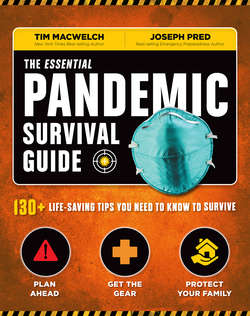Читать книгу The Essential Pandemic Survival Guide - Tim MacWelch - Страница 20
На сайте Литреса книга снята с продажи.
Оглавление14
basics
Even before an epidemic is formally declared, you can expect to be overloaded with information from various sources such as the news media, Twitter, Facebook, and directly from your friends and neighbors. Everyone will have an opinion and suggestions for what to do, and often you’ll get contradictory information—which makes everything more confusing and stressful. Here are
some simple ways to make sense of all the noise.
CHECK YOUR SOURCES Be skeptical of news sources you’ve never heard of before. Who the heck is “True Virus Times,” anyway, and why are they saying that spinach can cure you of whatever ails you? See if you can find reporting on the same information from other
news sources.
KNOW THE DIFFERENCE Opinion pieces, letters to the editor, and talk shows are generally not credible sources
of news.
INVESTIGATE EXTREME CLAIMS Rumor may be passed off as fact. Double check information to make sure it’s not a rumor. Especially when people start feeling desperate, an
irresponsible rumor can cause real harm.
CHECK THE DATE Sometimes articles that appear related from years earlier get carelessly reposted as current news. Avoid adding to the confusion by at least checking the
date before you hit “share.”
FACT CHECK Even trusted news sources can sometimes be wrong, especially in a fast-developing situation such as a spreading illness. Trust but verify with websites dedicated to fact checking or with respected international news
sources like the Associated Press or Reuters.
CHECK YOUR BIAS Be aware of the human tendency to accept information as true simply because it seems to
confirm your own beliefs.
FACT-CHECK THE NEWS
